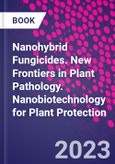Nanohybrid Fungicides: New Frontiers in Plant Pathology addresses new nanohybrid fungicides and the opportunities that nanoagrochemicals can provide. Organized into two parts, this book addresses the types of nanohybrid fungicides and general applications, commercialization, and remediation. Furthermore, nanohybrid fungicides represent an exciting new frontier in plant pathology. Their ability to enhance the efficacy of conventional fungicides, boost plant defense mechanisms, and reduce environmental impact makes them a promising tool for sustainable disease management in agriculture. Further research and development are necessary to overcome the existing challenges and fully harness the potential of nanohybrid.
Plant scientists, plant pathologists, agriculture and food scientists, and professionals and students working in related fields will all benefit from this timely resource.
Please Note: This is an On Demand product, delivery may take up to 11 working days after payment has been received.
Table of Contents
Part 1 What is Hybrid Nanofungicides?1. Introduction chapter: what is Hybrid Nanofungicides?
2. Current Topics of Nanotechnological Approach in Agriculture: A case study on Nano-based fungicides
3. Chitosan-based Agronanofungicides: A Sustainable Alternative in Fungal Plant Diseases Management
4. Gum nanocomposites for postharvest fungal disease control in fruits
5. Nanoencapsulation applications in fungicides
6. Antifungal potential of Nano and Micro-encapsulated phytochemical compounds and their impact on plant heath
7. The Antagonistic Yeasts: as novel and safe biological agents, nano/biofungicides for controlling fungal plant pathogens
8. Fungal metabolites as novel plant pathogen antagonists
9. Secondary metabolites from Trichoderma for effective plant pathogen control
10. Fusarium mycotoxins: potential as biocontrol agents
Part 2 General applications. commercialization and remediation
11. Applications of nano fungicides in plant diseases control
12. Nanoarchitectures for fungal diseases management in Agri-Food sector
13. Nanobiofungicides for the reduction of mycotoxin contamination in food and feed
14. Nano-Biopesticides: Significance, Preparation Technologies, Safety Aspects and Commercialization for Sustainable Agriculture
15. Nano-Agrochemicals Start-up Provides Sustainable Crop Protection Options
16. Patent Landscape in Biofungicides, Nanofungicides, and Nano-Biofungicides
17. Microbial bio-remediation of fungicides








